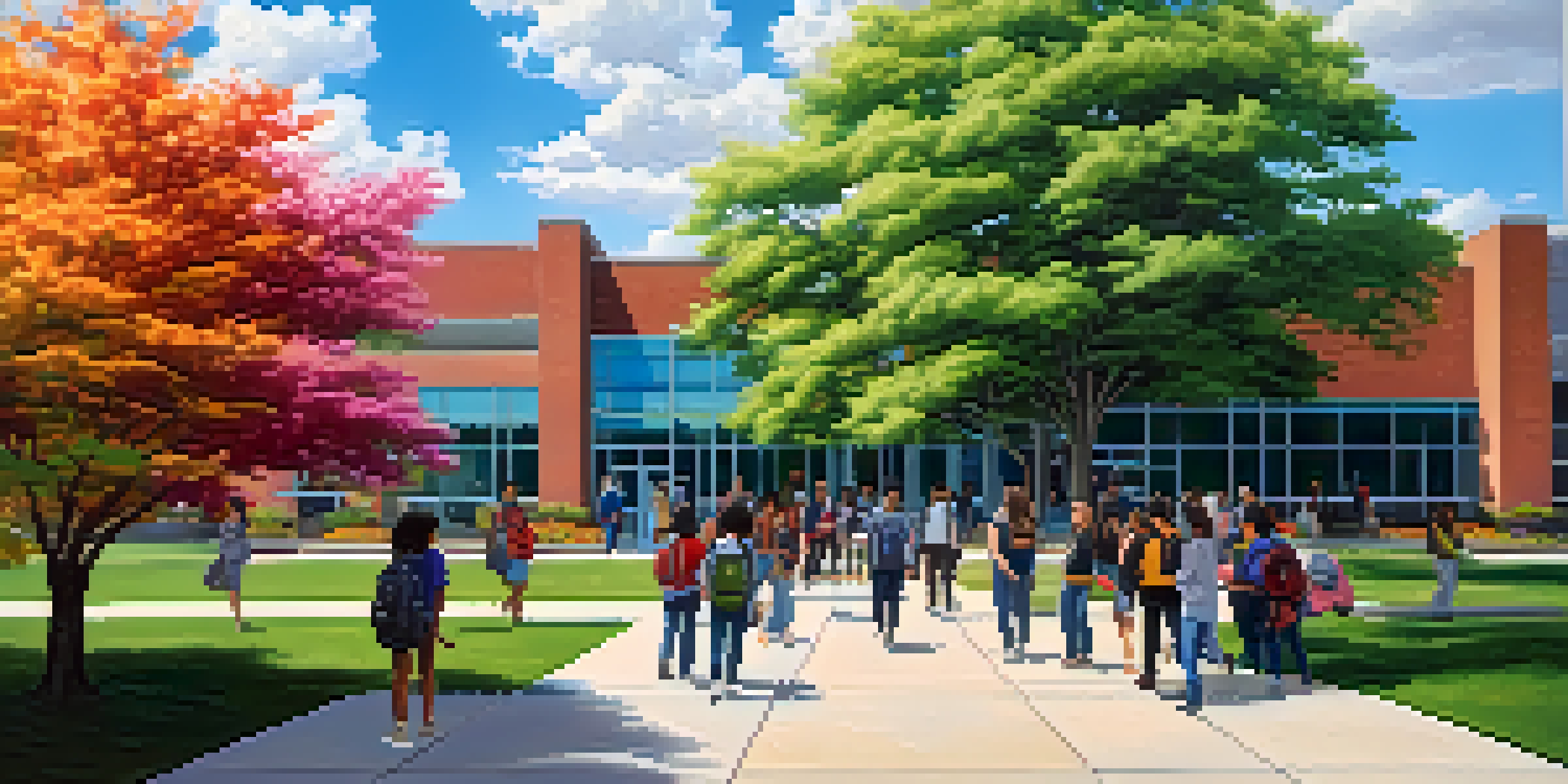The Role of Community Colleges in New Jersey's Education System

Introduction to Community Colleges in New Jersey
Community colleges in New Jersey serve as vital educational institutions that cater to a diverse student body. They provide accessible higher education options for those looking to enhance their skills or pursue a degree. With 18 community colleges across the state, they play a crucial role in the local economy and workforce development.
Community colleges are not just places to learn; they are gateways to opportunity for many individuals seeking a better future.
These colleges often offer flexible scheduling, making it easier for working adults and non-traditional students to pursue their education. This flexibility is instrumental in lowering barriers to education, particularly for those who may have other obligations, like work or family. In this way, community colleges act as a bridge to higher education for many individuals.
Additionally, community colleges are designed to be affordable, providing a cost-effective alternative to traditional four-year universities. With lower tuition rates, they enable students to obtain quality education without the burden of significant debt. This affordability is especially important in New Jersey, where the cost of living can be high.
Diverse Educational Programs Offered
Community colleges in New Jersey offer a wide range of programs that cater to various career paths and academic interests. From associate degrees in fields like nursing and engineering to certificate programs in culinary arts and information technology, these colleges cover diverse educational needs. This variety allows students to find a program that aligns with their passions and career aspirations.

Moreover, many community colleges partner with local businesses and industries to develop tailored programs that meet workforce demands. These partnerships ensure that students gain relevant skills and hands-on experience, making them job-ready upon graduation. For instance, some colleges have established programs in emerging fields like cybersecurity and renewable energy.
Community Colleges Enhance Accessibility
Community colleges in New Jersey provide affordable, flexible education options that cater to diverse student needs and help bridge barriers to higher education.
The flexibility of program offerings also includes evening and online classes, which cater to students with varying schedules. This adaptability encourages lifelong learning, allowing individuals to reskill or upskill as needed. As industries evolve, community colleges continue to adapt their programs to ensure that students remain competitive in the job market.
Community Colleges and Workforce Development
Community colleges play a pivotal role in workforce development in New Jersey, acting as training grounds for the next generation of workers. They focus on equipping students with the skills needed for in-demand jobs in various sectors. This alignment with workforce needs is crucial in addressing skills gaps in the local economy.
The future belongs to those who believe in the beauty of their dreams.
By collaborating with employers, community colleges can tailor their curricula to meet specific industry standards. This ensures that graduates possess the skills and knowledge that employers are actively seeking. For example, partnerships with healthcare organizations help shape nursing programs to align with the latest practices and technologies.
Furthermore, community colleges often offer job placement services and career counseling to support students as they transition into the workforce. These services help students network with potential employers and prepare for interviews, enhancing their employability. This comprehensive approach effectively contributes to reducing unemployment rates and fostering economic growth.
Fostering a Culture of Inclusion and Diversity
Community colleges in New Jersey are known for their commitment to inclusivity and diversity. They welcome students from various backgrounds, including recent high school graduates, adult learners, and international students. This diverse environment enriches the educational experience and fosters a sense of belonging among students.
These institutions often implement programs and services specifically designed to support underrepresented populations. For instance, mentorship programs and tutoring services help ensure that all students have access to the resources they need to succeed. By prioritizing equity, community colleges help bridge achievement gaps and promote social mobility.
Workforce Development Partnerships
By partnering with local industries, community colleges tailor programs to equip students with the in-demand skills necessary for today's job market.
Moreover, the diversity of the student body enhances peer learning and collaboration. Students are exposed to different perspectives and ideas, preparing them for a global workforce. This cultural exchange is invaluable and helps students develop essential soft skills, such as communication and adaptability.
Transfer Opportunities to Four-Year Institutions
Many students at community colleges in New Jersey aspire to transfer to four-year institutions to complete their bachelor's degrees. Community colleges facilitate this transition through articulation agreements with nearby universities, which outline the courses and credits that will transfer seamlessly. This process makes it easier for students to navigate their educational journey.
These agreements often allow students to complete their general education requirements at a lower cost before moving on to a four-year college. This pathway not only saves students money but also provides them with a solid academic foundation. Many students find that their community college experience better prepares them for the rigors of a four-year institution.
Additionally, community colleges offer resources like academic advising and transfer workshops to guide students through the transfer process. These support systems are crucial for helping students make informed decisions about their educational futures. By providing clear pathways to higher education, community colleges serve as stepping stones for many aspiring degree holders.
Community Engagement and Partnerships
Community colleges in New Jersey are deeply rooted in their local communities, often engaging in partnerships that benefit both students and residents. These collaborations can take many forms, from providing workforce training programs to hosting public events and workshops. This active engagement fosters a strong sense of community and encourages lifelong learning.
For example, many community colleges offer continuing education courses for adults looking to acquire new skills or hobbies. These courses not only enhance the skills of the local workforce but also promote personal enrichment and social interaction among residents. As a result, community colleges become hubs of learning and growth within their communities.
Seamless Transfer to Four-Year Schools
Community colleges facilitate smooth transitions to four-year institutions through articulation agreements, making higher education more accessible and affordable.
Moreover, partnerships with local businesses can lead to internship opportunities for students, further linking educational experiences with real-world applications. This synergy between community colleges and local organizations ultimately helps to strengthen the economy and create a more skilled workforce. Community colleges are not just educational institutions; they are key players in community development.
The Future of Community Colleges in New Jersey
As we look toward the future, community colleges in New Jersey are poised to continue their vital role in the state's education system. With the increasing demand for skilled workers in various industries, these institutions will adapt and evolve to meet changing educational needs. This adaptability is crucial for their ongoing relevance in an ever-shifting job market.
Emerging technologies and innovative teaching methods are likely to play a significant role in shaping the future of community colleges. For instance, the integration of online learning platforms allows for greater flexibility and accessibility, making education even more attainable for a broader audience. Community colleges are already embracing these advancements to enhance student learning experiences.

Ultimately, as community colleges expand their offerings and strengthen their community ties, they will continue to be a cornerstone of New Jersey's educational landscape. Their commitment to affordability, diversity, and workforce readiness ensures that they will remain an essential pathway for many individuals seeking higher education and career advancement.